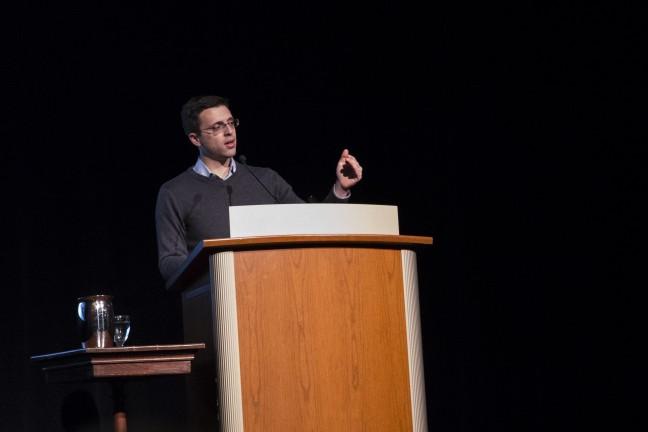Offering a frank assessment of American politics, editor-in-chief of Vox.com Ezra Klein said the entire game needs to be changed if any progress is to be made in a system mired in partisan gridlock.
Rather than fixate on individual players in the game of politics, Klein urged audience members at his Distinguished Lecture Series talk at Memorial Union Monday to instead think about reforming the entire game and its rules.
Klein outlined the concept of polarization, which he said is important to understand but is probably one of the most poorly comprehended concepts by the public.
“Polarization is a very simple measure of how far away political parties are from each other,” Klein said. “It is just a measure of how well sorted they are.”
The U.S. Congress has an approval rate of 9 percent, which, according to a poll, is less than that of Nixon during Watergate at 24 percent and Paris Hilton at 15 percent, Klein said. The 9 percent approval rating is also less than that of British Petroleum during the disastrous oil spill of 2010. Klein joked that when the American people prefer a company pumping crude oil into the ocean to an essential governing body, the public is clearly not getting what it wants.
Klein said part of the problem contributing to dissatisfaction is gridlock, which does not simply cause everything to stop but instead brings about a less efficient path. He compared gridlock to his father trying to take alternate routes while driving in L.A. traffic and growing angrier as those routes prove less efficient than the main roads.
“Gridlock is not what happens when nothing happens — it means Congress can’t do anything but it also means Congress can’t stop the other branches of government from doing things,” Klein said.
When this kind of gridlock happens, the Supreme Court and the president gain more power, as Congress loses it.
When the majority of power in decision-making is in the hands of the president or the Supreme Court, they are often doing Congress’ jobs in a less efficient way, Klein said.
“Congress is supposed to exist at the center — they’re failing at this,” Klein said. “This is a fundamental problem.”
Klein spoke on the instability of American government due to the various different branches of government that are unable to solve disputes. Because of polarization, he said the minority has the incentive and the power to make the majority fail.
Unlike other systems, where the minority may not have the power to make the majority fail, the American minority does and can take advantage of that, Klein said.
Prior to polarization, the minority did not have this kind of power, Klein said. The problem is centered in Congress and simply changing the president isn’t an effective way to correct the issues in Washington, he said.
“Gridlock is kind of like full-contact American sports, it is part of the rules of the game,” Klein said. “We sit around and frame it as an individual problem and then we try to fix it by electing different people and we are surprised when these people do the exact same things.”
The reason politics work the way they do is because that is how the system was built, and in order to see change people must change the rules of the game, he said.
Klein said it is important to realize politicians are making rational decisions within a system, yet these individual rational decisions are turning out to be a disaster because of the system itself.
“You can argue that it is a collective action problem,” Klein said. “What is rational for the individuals is a disaster for the country. Smart for one and dumb for all.”














